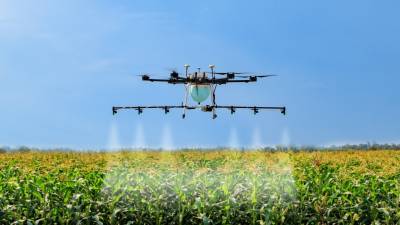MUMBAI, 7 November 2024: In recent years, drone technology has emerged as a game-changer in various industries, and agriculture is no exception. Drones, also known as unmanned aerial vehicles (UAVs), are revolutionizing crop monitoring and spraying, offering farmers innovative solutions to enhance productivity, efficiency, and sustainability.
As the agricultural sector faces increasing challenges such as climate change, resource scarcity, and the need for higher yields, drones provide a powerful tool to address these issues.
The Evolution of Drones in Agriculture
Initially developed for military and recreational purposes, drones have found diverse applications in agriculture due to advancements in technology and decreasing costs. Equipped with high-resolution cameras, sensors, and GPS capabilities, agricultural drones can collect vast amounts of data, providing farmers with detailed insights into their fields. This data-driven approach is transforming traditional farming practices, making them more precise and efficient.
Key Applications of Drones in Agriculture
- Crop Monitoring and Health Assessment
One of the primary uses of drones in agriculture is crop monitoring. Traditional methods of field scouting are labor-intensive and time-consuming. Drones, however, can cover large areas quickly and capture high-resolution images and multispectral data, allowing farmers to monitor crop health in real time. By analyzing this data, farmers can identify issues such as nutrient deficiencies, pest infestations, and diseases early on, enabling timely interventions.
- Precision Agriculture
Precision agriculture aims to optimize the use of inputs like water, fertilizers, and pesticides to enhance crop yields and minimize environmental impact. Drones play a crucial role in this by providing accurate data on soil health, moisture levels, and crop conditions. This information helps farmers apply inputs more precisely, reducing waste and improving efficiency. For instance, variable rate application (VRA) of fertilizers and pesticides can be achieved through data collected by drones, ensuring that only the necessary amounts are used.
- Crop Spraying
Drones equipped with spraying mechanisms can efficiently and uniformly apply pesticides, herbicides, and fertilizers to crops. This method is particularly useful in areas with difficult terrain or where access is limited. Drone spraying ensures even distribution, reduces the risk of chemical exposure to farmworkers, and minimizes the environmental impact by reducing runoff. Moreover, drones can operate at low altitudes, enabling precise targeting of specific areas.
- Irrigation Management
Efficient water management is crucial for sustainable agriculture, especially in regions facing water scarcity. Drones equipped with thermal cameras can assess soil moisture levels and identify areas that require irrigation. By providing detailed maps of moisture distribution, drones help farmers optimize irrigation schedules and avoid overwatering or underwatering, leading to better crop health and water conservation.
- Planting and Seeding
Innovative drone technology is also being used for planting and seeding. Drones can disperse seeds in a precise and uniform manner, covering large areas quickly. This is particularly beneficial for reforestation projects and planting in remote or inaccessible areas. Additionally, drones can plant in patterns that maximize land use and promote efficient growth.
Benefits of Drone Technology in Agriculture
- Cost Efficiency
Drones can significantly reduce labor costs associated with field scouting, monitoring, and manual spraying. They also minimize the use of inputs like water, fertilizers, and pesticides, leading to cost savings for farmers.
- Time Savings
Drones can cover large areas in a fraction of the time it would take using traditional methods. This allows farmers to monitor and manage their fields more frequently and efficiently, leading to quicker decision-making and response times.
- Improved Accuracy
High-resolution imagery and precise data collection enable farmers to make informed decisions based on accurate and up-to-date information. This level of precision enhances crop management practices and leads to better yields and quality.
- Environmental Sustainability
By optimizing the use of inputs and reducing waste, drones contribute to more sustainable farming practices. Targeted spraying and efficient irrigation reduce the environmental impact of agriculture, promoting long-term sustainability.
- Enhanced Productivity
With better crop monitoring, timely interventions, and optimized resource use, farmers can achieve higher productivity and profitability. Drones enable proactive management, reducing crop losses and improving overall farm performance.
Challenges and Future Prospects
While drone technology offers numerous benefits, its adoption in agriculture is not without challenges:
- Initial Investment
The cost of purchasing and maintaining drones, along with the necessary software and training, can be a barrier for small-scale farmers. However, the long-term benefits and cost savings can outweigh the initial investment.
- Regulatory Framework
The use of drones is subject to regulations that vary by country and region. Navigating these regulations and obtaining the necessary permissions can be complex and time-consuming for farmers.
- Technical Expertise
Operating drones and analyzing the data they collect require technical skills and expertise. Farmers may need training and support to effectively utilize drone technology.
- Data Management
The vast amounts of data generated by drones need to be processed and interpreted to provide actionable insights. Effective data management and integration with other farm management systems are essential for maximizing the benefits of drone technology.
Drone technology is poised to revolutionize agriculture by providing innovative solutions for crop monitoring, spraying, irrigation management, and more. As the agricultural sector faces increasing challenges, drones offer a powerful tool to enhance productivity, efficiency, and sustainability. While there are challenges to overcome, the benefits of drone technology far outweigh the obstacles.
With continued advancements and increasing adoption, drones will play a crucial role in the future of agriculture, empowering farmers to achieve higher yields and more sustainable practices.























